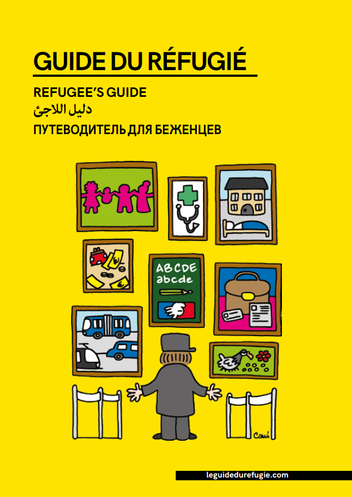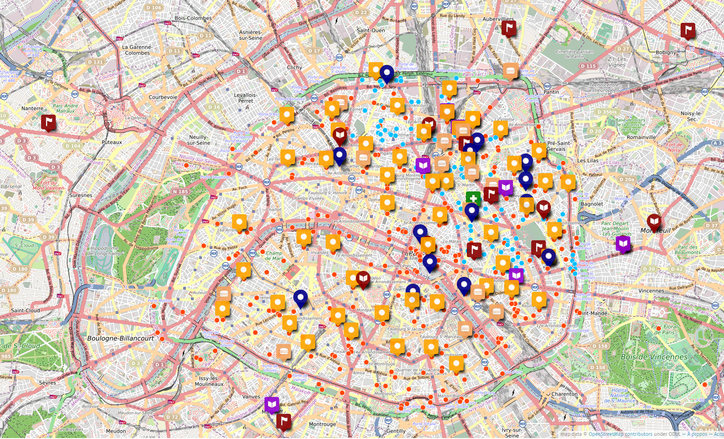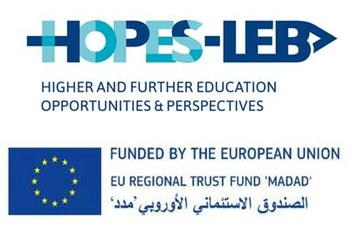Practical information and daily life of refugee students in France

Many initiatives have been introduced to help refugee students settle in France.
Obtain your residence permit
There are different procedures to obtain a residence permit depending on the visa on which you arrived in France. We recommend that you visit the website of GISTI, the Groupe d’Information et de Soutien des Immigrés (Group Providing Information and Support to Immigrants).
To find out more about how to apply for asylum, you can also visit the website of OFPRA, the French Office for the Protection of Refugees and Stateless Persons. There is also a Guide for Asylum Seekers in France, available in around twenty languages.
Refugee status
If OFPRA grants you refugee status, you will receive a residence permit valid for 10 years, which is renewable. You must apply for one at the prefecture.
Financial assistance
CROUS scholarships
Students with refugee status in France and students who are beneficiaries of subsidiary protection have access to scholarships managed by CROUS, regional centres of student social services. To benefit from them, you must :
- or to be enrolled in a full-time first degree national diploma in a public or private higher education institution that accepts scholarship holders.
- be enrolled in a DU "Passerelle - étudiants en exil" (University Diploma "Passerelle - Students in Exile")
CROUS scholarships are retroactive. For example, if you are a refugee or beneficiary of subsidiary protection, you may apply for a scholarship 3 months after the start of the academic year. You will be paid the scholarship amount for the three months.
The scholarships are granted on social grounds and offer the following benefits:
- Payment of a monthly scholarship
- Exemption from university tuition fees
- Exemption from paying the CVEC administrative fee (Contribution Vie Etudiante et de Campus, Student and Campus Life Contribution).
You will have to create an account on messervices.etudiant.gouv.fr and register at cvec.etudiant.gouv.fr. - Priority in the allocation of student housing in a CROUS residence.
To find out more, visit the pages dedicated to scholarships on the portal etudiant.gouv.fr.
CROUS points of contact for refugee students in universities have been identified. Their contact details are available online in an interactive directory.
To find out more about available scholarships, please refer to the scholarship programmes offered by Campus France: Campus bourses.
Accommodation
Refugee students and beneficiaries of subsidiary protection are entitled to housing in CROUS university residences. This type of student housing is most affordable and best adapted to easily acclimatise to student life in France. Find out all the steps to submit an application for a room on the pages dedicated to university residence housing on the portal etudiant.gouv.fr.
You can also reach out to municipal social action centres (CCAS, centres communaux d’action sociale).
To find emergency temporary accommodation, you can use the "J'accueille" program powered by Singa. It puts refugees looking for accommodation in touch with French citizens who have a spare room in which to host them.
To find alternative housing options, please read our article on the various types of student accommodation or the pages dedicated to housing on the portal étudiant.gouv.fr.
Meals
CROUS university restaurants offer high-quality meals and refreshments suited to student budgets: 3.30 euros for an all-inclusive meal deal (1€ for scholarship holders). Simply show your student card to take advantage of it. They are often located on campus or near universities.
Contact your local town hall (mairie) to find out about associations that campaign for the protection of foreigners in France. They often offer free meals.
To find out more, read our article on the various ways to eat daily meals in France and the pages dedicated to meals on the portal étudiant.gouv.fr.
To help you find the university housing and restaurants closest to you, please refer to the interactive map of CROUS restaurants and residences.
Health care
There is a healthcare service within universities themselves: SUMPPS, Service universitaire de médecine préventive et de promotion de la santé (University Preventive Medicine and Health Promotion Service). If you need to see a doctor, you can visit a SUMPPS centre. Some consultations are free, including those relating to contraception, screening, vaccinations and mental health counselling. You can also find the contact details of a doctor and make an appointment online on the website doctolib.fr.
It is free but mandatory to register with the French social security system. This should be done after enrolling in a higher education institution on the platform etudiant-etranger.ameli.fr. Students who are refugees or beneficiaries of subsidiary protection must present the residence document issued to them and that acknowledges their status.
Social security refunds up to 70% of your healthcare costs. To cover more of your expenses, you can take out complementary health insurance, called a “mutuelle”.
To find out more, read our article on student health or the pages dedicated to health on the portal etudiant.gouv.fr.
Daily assistance
- CROUS points of contact for refugee students in universities. They can provide information on how to enrol, register for social security, find accommodation, and much more.
- SINGA is a citizens’ movement, the aim of which is to create ties and encourage interaction between refugees and French citizens. It offers programmes that promote meetings and discussions.
Refugee’s guide
If you already have refugee or stateless status or are a beneficiary of subsidiary protection, there is a guide for you: the Refugee’s guide, available in 4 languages (English, French, Arabic and Russian).
Complete with testimonies of refugees, it contains information on your rights and will help you through various processes. You can read it on a computer or download it to your smartphone.

Welcome map of Paris
Do you live in Paris? To help you on a daily basis, there is an interactive map, the Welcome Map, which shows a variety of useful places: food distribution points, French lessons, associations, libraries, hospitals and Wi-Fi hotspots.

The map is available in Farsi, Turkish, French, English and Arabic.
Related contents
Recommended items




















































